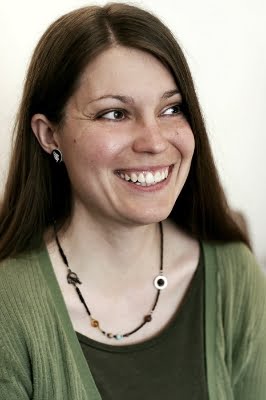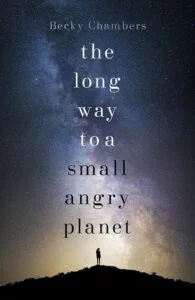In a refreshing change from the usual format of our “How I Do It” feature, ALLi author and indie advocate Dan Holloway interviews Becky Chambers, whose self-published novel The Long Way to a s Small, Angry Planet made the Kitschies‘ shortlist for the Best Debut Novel. Since they were launched in 2009, the Kitschies have become not just one of the most respected awards for science and speculative fiction, but a major part of the literary awards calendar.
Dan Holloway: There are so many cool things and hot button topics I don't know where to start. How about the Kitschies – they're relatively new but everyone seems to love them – what makes them so special?
Becky Chambers: I think maybe it's because they're new. I don't know. When I think of the Hugos or the Nebulas, I picture these big, marbled institutions. Beautiful and stately, very serious. The Kitschies are like that funky indie cabaret your friend takes you to, where you're in a part of town you don't know and you have no idea how you're going to get home, but the second you walk inside and see what's on display, you can't wait to tell everybody you know about it.
Dan Holloway: Then there's Kickstarter. I've seen some wonderful books funded that way. You asked for time rather than anything material, which makes sense. It's what we all need most,but did it feel nerve-wracking to ask? And I love the $500 reward – everything you ever publish – that's a wonderful offering. What do you imagine it will look like in 50 years' time?
Becky Chambers: Gosh, there's a question. Hopefully a big stack of books and a lot of post office receipts.
As for the campaign, it was more humbling than nerve-wracking (aside from the general anxiety that goes along with any sort of crowdfunding endeavor). I know I'm not the only one out there who's felt the sting of shrivelling freelance budgets, but it's very hard to not feel like a failure when you're staring down a few months without any paying work lined up. I was candid about why I was seeking funding, which I felt was only fair, and it did make me feel vulnerable. But the way I figured it, it wasn't terribly different from what bigger campaigns do. Video game Kickstarters, for example, often earmark a portion of their funding goal for hiring an artist or a sound designer. I was just asking for the means to hire myself.
Dan Holloway: And then there's the whole self-publishing thing. You are up front in your Kickstarter that your first choice was the traditional route, and you have subsequently signed a significant deal. Does the fact that you had to go through the self-publishing stage to get the attention of people who didn't give it to you initially frustrate you?
Becky Chambers: Not at all. I think both paths have a great deal of merit, and the stigma of doing it yourself is swiftly (and rightfully) dying. I was very glad to have the option of self-publishing when the traditional route didn't work out the first time around. Rejection sucks, of course, but I actually took a lot of pride in being able to put the book out there anyway. That's an option I wouldn't have had a decade or two ago, and I count myself very lucky to have had it.
I also know that traditional publishing is a total crapshoot, in a lot of ways. I got my deal through dumb luck more than anything, meeting people who led to other people who read my book, who shared it with others… that kind of thing. I knew a year ago that people turning down my work was just because I hadn't found someone who liked the story enough. Because, I mean, who knows? Maybe the editor who rejected my pitch read another space opera pitch an hour ago that she liked better. Maybe she has a pathological fear of lizards and was put off by my reptilian species. Maybe she gets too many pitches about spaceships. Maybe it just wasn't her thing. None of that has anything to do with me, or my work. It's all just a matter of finding the right person, and there is no way to plan for that. So, no, I wasn't frustrated. It's hard to be frustrated about something that's so impossible to predict.
Dan Holloway: And how was the self-publishing experience?
Becky Chambers: Very positive and totally grueling. It was a big learning curve, and I had to climb it rather quickly. I owe a lot to all the amazing bloggers and self-publishing champions out there who write resources and how-tos and whatnot. Many of them do it for free, and you can tell it's a real labour of love. So, really, it wasn't “self” publishing. I couldn't have done this without building off of other people's knowledge. Or without my beta readers and backers, for that matter. I didn't do this alone, and I am incredibly grateful for that.
My favorite part of the whole self-publishing process was collaborating with my cover artist, Christopher Doll. He was wonderful to work with, and I loved letting him pick my brain about what the ship looked like. I was always so excited to open my inbox and find new sketches to download. I had so much fun with that. Much more fun than formatting for different ebook file types. That part, I don't miss.
Dan Holloway: I love the description of the book. I can see at once the word that may have made publishers nervous, and it's one of the things that's most interesting about the book: “episodic.” Do you think publishers tend to underestimate readers?
Becky Chambers:I think publishers generally have a lot of respect for readers. Western society, however, has a lot of deeply, deeply ingrained ideas about what constitutes a proper story. If you formally study any kind of storytelling medium (my background's in theatre, with creative writing by proxy), the conflict-heavy three-act structure is beaten into you, and anything else is smacked down hard. I knew my book would be a hard sell because it's not that. There is conflict, and there's an overarching rise and fall, but none of that is the driving force. The plot isn't the driving force, either. It's about the characters, and their lives, and the things they experience. It's more of a slice-of-life kind of story, in some ways. I knew when I went into this that episodic novels put some publishers off (and some readers). I was cool with that. I'm still cool with that.
Kickstarter was my litmus test for seeing whether people were actually interested in a story like the one I wanted to tell. When I decided to create the campaign, my agreement with myself was that if it wasn't successful, that was my sign that I needed to focus my attention elsewhere. But some folk were interested in it. I think there are lots of readers out there who are hungry for stories and structures they don't see every day. If you're not looking for that, if you're comfy with three acts and lots of conflict, that's totally fine. Go forth and enjoy. The point is not that one approach is better than another. The point is that there are lots of ways of telling a story. I believe there's more room for that in popular culture than tends to be acknowledged.
Dan Holloway: The other thing about a novel that weaves so many strands together is that it takes a lot to weave those strands into something that works as a whole. Now I sound like one of those publishers – that's not what I mean, I mean making it feel as though each of the strands has been deliberately chosen because it contributes something to the whole. Did it feel brave tackling such an ambitious structure, and did you worry whether you could pull it off?
Becky Chambers: Oh, I worried about that constantly. I didn't think it would work at all. There were so many times when I looked at my first draft and wondered what the hell I was doing. That feeling prevented me from getting started for a long time. I'd been writing little snippets about this crew since college. I had a whole box full of scenes and conversations that I had no idea what to do with, because there weren't three acts, see. There were just these people, doing stuff together. Once I dove in, I found that all those pieces actually had a lot to do with each other, and were connected in ways I hadn't initially realised. But it terrified me the whole way through. I'm still surprised when people tell me they like it, to be honest. When somebody tells me that they think it's a good story, there's a part of me that lets out this massive sigh and says “oh, thank god.”
Dan Holloway: One thing the Alliance of Independent Authors' (ALLi) readers will want to know about is your editing process, which you allude to in your Kickstarter. Was it hard to find a sympathetic editor, and what was the process you went through?
Becky Chambers: I have a confession to make: I didn't hire an editor. I know, I know. My editing process ended up being done by committee. My first round of editing I did on my own, after a full read of my first draft. The second came after the beta read. I had ten readers, if I remember correctly, and I chose them for very different reasons. Some were colleagues: writers and editors I already had working relationships with. Some were sci-fi fans, aka the intended audience. The others were close friends who I knew wouldn't sugarcoat things for me. That whole process was immensely valuable. They provided such great feedback, and there was a surprising amount of overlap between what worked for them and what didn't.
The third round of editing was at the behest of my former literary agent, who provided me with excellent notes. It was nothing major – a few cuts, a couple of added scenes. He was right on the money about everything he suggested. When I decided to self-publish, I did one last read-through and made some final tweaks. All of that, from the first read to the last, took place over the course of a year and a bit.
Dan Holloway: Once you had self-published, how did the book go from a voice calling into the void to the Kitschies' nomination?
Becky Chambers: It's a pretty short story. Someone suggested that I submit it. I didn't think it would make it past the slush pile, but I figured there was no harm in tossing my name in the hat. You could've knocked me over with a feather when I was told about the shortlist.
Dan Holloway: You're also a journalist writing for a fan base to whom your book clearly would appeal. Did that help, and how did you go about telling those people about the book?
Becky Chambers: I'm recently retired from journalism, but I'm a fan first and foremost. I can't imagine how someone who never squeed over anything would take up pop culture crit. I wrote this book because it was the sort of thing I wanted to read, and I figured if I wanted to read it, there was a non-zero chance that people who liked the same stuff I liked might want to read it, too. That gave me the courage to put it out there in the first place.
On a practical note, having a small readership was a big help in getting the campaign funded. Most of my backers were already familiar with my existing writing. I doubt I would have succeeded without that. As for getting the word out, I didn't do anything fancy, just a mention about the campaign, and later, links to sales channels, in my byline, and occasional updates on Twitter. I was pretty casual about it, just like, “Hey, here's my book, if you're interested. And if not, cool, let's keep talking about video games.” I'm not much of a marketing person. I just figure if you make something that people like, they'll pass it along.
Dan Holloway: Finally, the obvious, cringeworthy question everyone always asks a writer. Reading your biography, you have made your home in some very different places. That must have helped when writing a book about itinerant characters? Has it made you interested in those larger questions of searching, restlessness, and what or where we might think of as our home?
Becky Chambers: Most of those little scenes and conversations I mentioned were written in airports, or on planes/trains/buses. I've spent a ridiculous amount of the past decade in transit, and I drew on that when I wrote the book. I also pulled a lot from the experience of being a temporary ex-pat, which is something I think more folk should experience. There's this weird thing that happens when you leave the place you were raised in for a while, then come back: you don't really fit anywhere anymore. You were always the outsider elsewhere, but your homebase looks completely skewed when you return. That feeling never goes away. Travelling is such a rewarding experience, but it can be very sad and uncomfortable at the same time. The crew in The Long Way experiences that sense of transience in many different ways. You have Rosemary, who has just left the Solar System for the first time. Dr Chef, who has nowhere to go back to. Sissix, who is culturally homesick, a feeling I think any ex-pat knows well. All of them have different ideas of what home means to them. That's something I chew on a lot.
#AuthorALLi's Dan Holloway interviews @beckysaysrawr on being shortlisted for t@TheKitschies award Share on X





